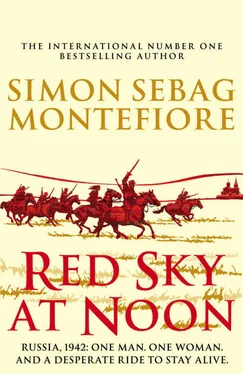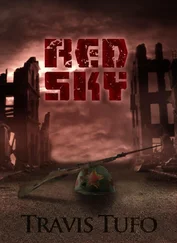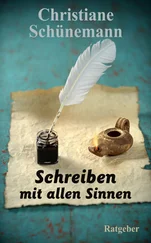When Fabiana awoke, she imagined herself as a girl during the school holidays lazing in a field in the countryside. All she could smell was the sweet dust that she associated with harvest and the masculine leather of saddles. She was on the ground, on a blanket, her head on a saddlebag. A crackle of shots somewhere, then the familiar boom of the big guns, and the smell of burning and diesel. Though the evening light was beginning to fade, it was still hot. Her blouse was open; fingers of sweat ran down her chest and her back. She opened her eyes. There was someone else with her. She heard a horse whinny and the reality struck her: she was in the war, her husband was dead, Malamore was out there looking for her; and she, a nurse of the Armata Italiana, was with a Russian man – a Jew and probably a Communist, a convict who’d served in the Camps – a stranger whom she hardly knew.
She felt sick. She couldn’t see how she could return to her own side now. Her people would surely execute her. She imagined scenarios of shots fired through the grass; she could taste her own end, feel the massive blow of a bullet smashing into her; she could see herself lying on the grasslands, her mouth a little open, her eyes staring. Could she lie about what had happened? Would they believe her? Or court-martial her? If so, better to perish out here. The shame for her darling parents if she was shot for treason… Everyone would hear of it on the Campo San Stin, the archive, the school… She would ruin them all.
Fabiana lay still and cursed her own impulsive stupidity. In normal life, there’s always a way to reverse even the silliest of decisions but not in war and she wanted to weep. She was going to die very soon and with this knowledge came a bracing surge of freedom. She could be anything now, do anything. She could say what she wished. She belonged to no country, no city, no man. She was living breath to breath. She had seen many men die, she had been beaten by her husband Ippolito, she was in a wild, hostile land and she was surprised to find that she was not so afraid of dying any more. She had seen so many young men step across that threshold, just a breath one side, and no breath the other. Instead, a sudden joy rushed through her. This field of sunflowers was her own private kingdom and here things couldn’t be simpler. A cottage, two horses, two beehives, a well – and this man.
She turned over and Benya Golden was looking back at her, lying on his side. Blue eyes speckled with yellow. She had spent hours watching him in the tent but then he had been weak, unconscious, like a sick child. Now he gave her a look of greeting and she returned it. He too, she sensed, was as much himself as he could be out here on the steppe, on the run. They said nothing for a while. He was very thin, she noticed again, his nose hawkish, and he had a certain sort of Jewish face and very long black eyelashes. The thinness made him seem older than his early forties; his fair skin was tanned by riding on the steppe; his shorn hair and his beard though growing fast in the heat were sown with grey.
He sat up and shook off the dust and hay, and the ashes, that seemed to float in the air all the time.
‘You’ve been awake long?’ she asked.
‘I’ve been up for a while. I must ride on soon,’ he said. She reached into her saddlebag and handed him bread and some fruit. Then they fell upon the honey and this time he watched her as she scooped chunks of honeycomb and ate it off her cupped fingers and he did the same, which made them both laugh as the honey revived them. Then she brought out a flask, a man’s regimental flask engraved IB, which he knew had belonged to her husband Ippolito Bacigalupe.
‘Armenian cognac.’ She handed it to him. He took a mouthful; then she did the same.
‘We mustn’t take too much,’ he said.
‘Why not?’ she answered. ‘We deserve it and’ – she shrugged – ‘this is a beautiful place and we’re alive…’ She took another swig and he accepted it too. ‘There’s nothing more decadent and delicious than drinking at breakfast,’ he said, the sort of urbane line he’d used to say in his old life. Now it seemed absurd.
Beside them their horses whickered as they drank water from the bucket Benya had brought them. Standing guard on every side, the sunflowers whispered and swayed, raising their focus towards the last rays of the setting sun.
‘You said, “I must ride on…”’ she started.
Benya nodded. ‘You have to go back. The longer you’re with me, the harder it will be for you. It won’t just be Italians looking for us now. Germans and Hiwis will be too. The Kalmyks scouts will track us, and will work out we didn’t take the direct route back to the Russian lines. Please, ride to the nearest village… You can blame me, say I held you at gunpoint, that I kidnapped you, I committed untold cruelties, appalling liberties, ravished you savagely…’
‘Am I a danger to you too?’ she asked, understanding suddenly what was bothering him.
He sighed. ‘If they have you back, no one will bother to chase a Russian prisoner. It’s you they want. I’m unlikely to make it but I have a better chance alone. And you don’t need to die too… Please, Fabiana. You must live.’
‘That’s a generous offer,’ she said, looking at him deeply. ‘Traditionally only the gods could make such an offer but you, a fugitive, a convict on the run, make it too… That’s magnificent.’
‘We have a word for that. Chutzpah. ’
She knew he was right. ‘OK, I’ll go.’ She pulled on her boots and stood up, rolling up the blanket, carrying her saddlebags towards her palomino.
Their two saddles sat side by side, between the two hobbled horses, the leather warmed by the sun. He came to help her with the saddle and, without a thought, she dropped the blankets and bags.
‘ Arrivederci. Somehow forever,’ she said, turning towards him. ‘No, maybe just goodbye. Forever.’
‘ Alt! ’ Malamore held up his hand and raised his binoculars in the gathering dusk. ‘The scouts are coming back.’
Dirlewanger rode on one side of him, Montefalcone on the other. Behind them followed a circus of men in uniforms: a band of Dirlewanger’s ‘poachers’ wearing German army grey with SS runes and those gruesome trophy necklaces, a few Italian Savoy Celere with their feathered caps, some Blackshirts, Hiwi Cossacks and Schuma militiamen. The Baby Doctor brought up the rear, his satchel of papers around his neck. The girl sat on his saddle in front of him, his hand on her belly. Wearing tank commander’s goggles against the dust, Malamore was scouring the long horizon.
Night was falling but the steppes – so empty in the early morning – were buzzing with activity. They encountered lines of German tanks, hatches open with their drivers wearing goggles. Wehrmacht soldiers were riding on them, dusty boys waving through the haze. Montefalcone noticed that they smirked at the motley exoticism of their squadron and seemed unimpressed by these apparent freaks conducting ‘anti-partisan aktions ’. Occasionally they saw Soviet tanks; a T-34 with a broken track now on the back of a truck was being repaired by some of Kaminsky’s engineers, and a burnt-out heavy KV was surrounded by charred wizened figurines the size of children. And everywhere there were dazed families riding in horse-drawn carts piled high with mattresses and pans and household icons, or heaving wheelbarrows, or just walking, walking and pleading for water: ‘Water for the children…’
In the distance, Malamore saw the Kalmyk scouts, wiry men with Mongol faces, drooping moustaches and scarlet blouses, curved swords on their backs, riding on quick, scrawny ponies. They were approaching fast.
Читать дальше












